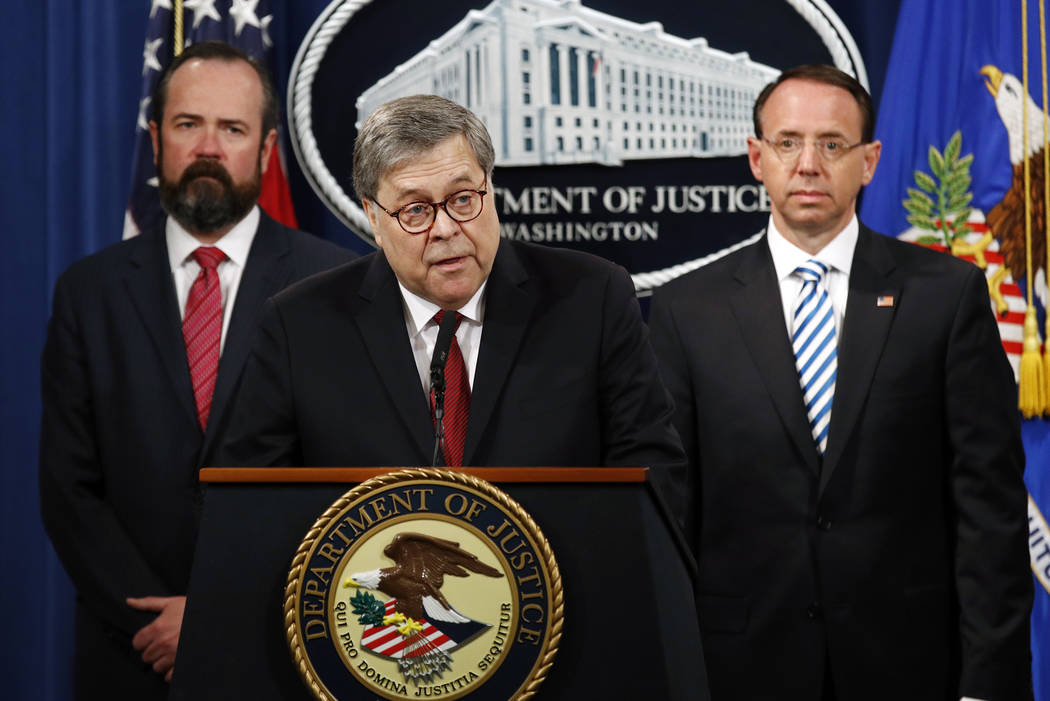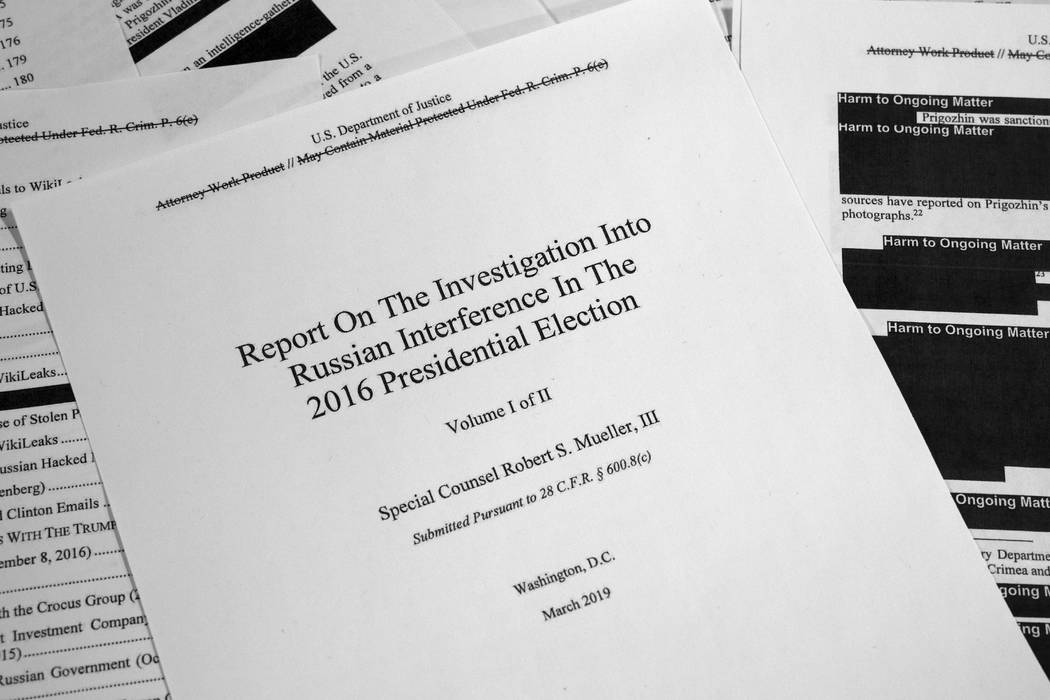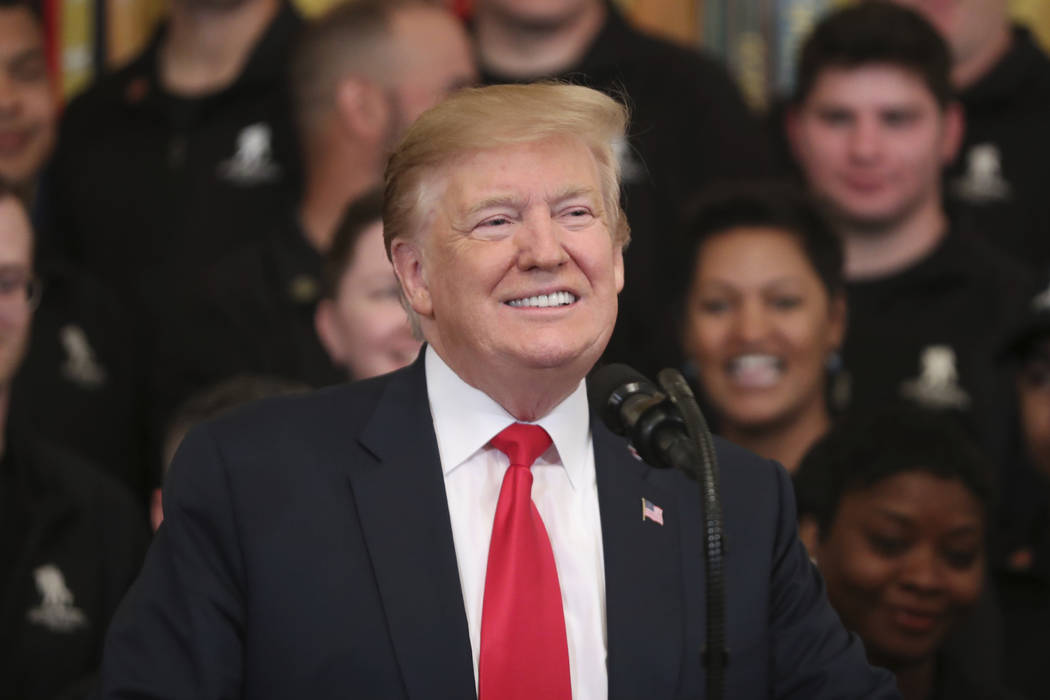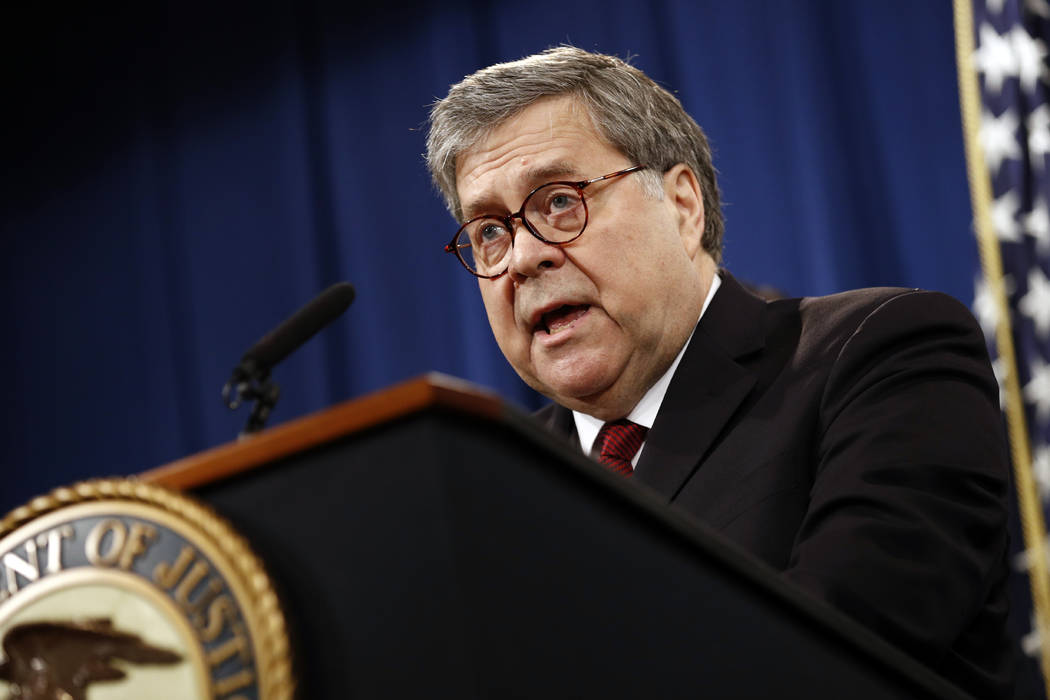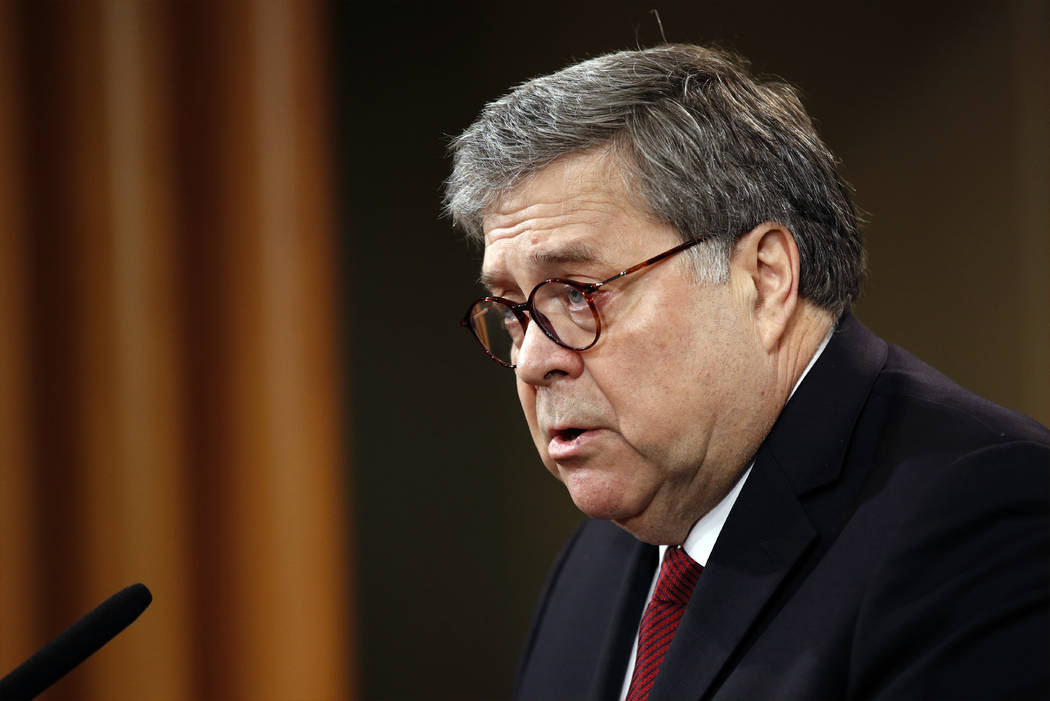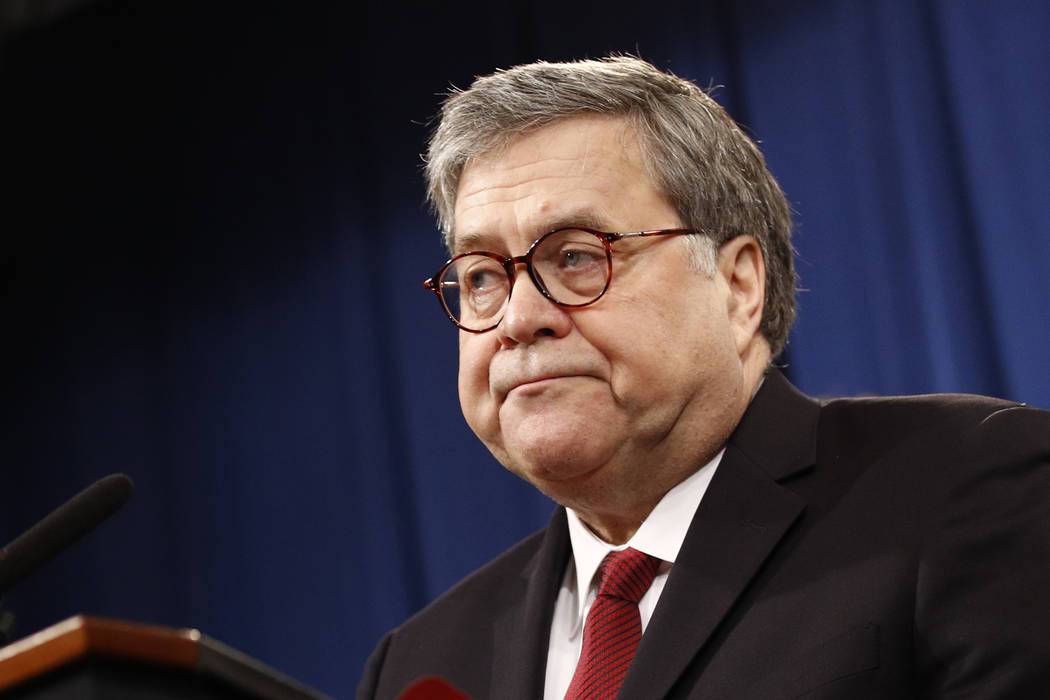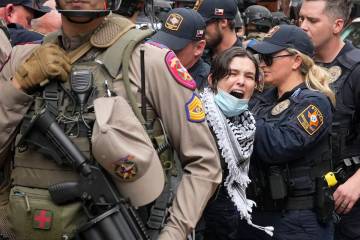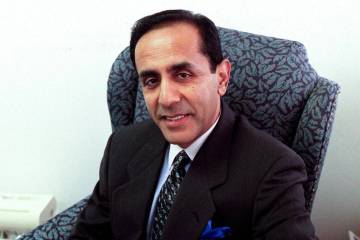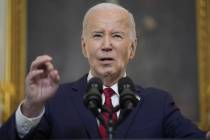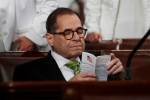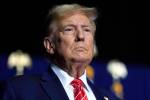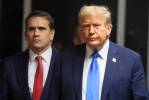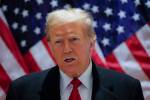Trump declares victory in wake of Mueller report release
WASHINGTON — President Donald Trump declared victory after a redacted version of Special Counsel Robert Mueller’s report was made public Thursday, although the document pointedly did not exonerate the president on the question of obstruction of justice.
However, Mueller’s report concluded that neither President Trump nor his 2016 campaign colluded with Russia’s “sweeping and systematic” interference in the 2016 election.
“If we had confidence after a thorough investigation of the facts that the president clearly did not commit obstruction of justice, we would so state,” the report says. But based on the facts and the law, “we were unable to reach that judgment.”
Flush with victory, Trump told a gathering of the Wounded Warrior Project Ride in the East Room he was having a good day. “It’s called, ‘no collusion, no obstruction’,” the president said.
The report portrayed a president who readily lied to reporters, bullied staffers to do likewise and dangled pardons before indicted former associates, but notably did not take steps to prevent emails or other damning communications from reaching Congress or the special counsel’s office.
Attorney General William Barr told journalists before the report’s release that Trump was “frustrated and angered by a sincere belief that the investigation was undermining his presidency, propelled by his political opponents, and fueled by illegal leaks. Nonetheless, the White House fully cooperated with the special counsel’s investigation, providing unfettered access to campaign and White House documents, directing senior aides to testify freely and asserting no privilege claims.”
Democrats, however, took a darker view of the report’s conclusions.
“The report outlines multiple attempts to mislead the American public,” said Adam Schiff, chairman of the House Intelligence Committee. Those actions made Mueller’s job more difficult, he said.
Added Schiff: Those acts, whether “criminal or not, are deeply alarming in the president of the United States. And it’s clear Special Counsel Robert Mueller wanted the Congress to consider the repercussions and the consequences.”
Ignoring the president
Aside from the legal issues, the report exposed a White House managed by an increasingly enraged president who, fearing the Russian probe would destroy his tenure in the Oval Office and diminish the legitimacy of his underdog campaign victory, repeatedly ordered top aides to do things they refused to do, often without informing Trump.
According to the document, Trump repeatedly told then-White House Counsel Don McGahn to remove Mueller. McGahn refused and mulled resigning from his job.
Trump also directed former campaign manager Corey Lewandowski to order then-Attorney General Jeff Sessions to reverse his recusal from the Mueller probe or else he would fire Sessions. Lewandowski did not follow through, and instead passed the task to an aide, who also did not comply with Trump’s demand.
After Trump told then-Chief of Staff Reince Priebus to fire Sessions, Preibus eventually dissuaded Trump from the idea, warning of a possible “Saturday Night Massacre” – a reference to President Richard Nixon’s order to his Attorney General Elliot Richardson to fire Special Prosecutor Archibald Cox during the Watergate scandal. Rather than fire Cox, Richardson and his deputy attorney general resigned. Within a year, Nixon, too, had resigned to avoid impeachment.
“The president’s efforts to influence the investigation were mostly unsuccessful,” the report noted, “but that is largely because the persons who surrounded the president declined to carry out orders or accede to his requests.”
Major turning point
Trump’s actions to badmouth and undercut the probe served to alienate Department of Justice officials who bristled at his rhetoric and his May 2017 firing of FBI Chief James Comey.
The report noted, “On June 14, 2017, the media reported that the special counsel’s office was investigating whether the president obstructed justice. Press reports called this a ‘major turning point’ in the investigation: while Comey had told the president he was not under investigation, following Comey’s firing, the president now was under investigation.”
The report lays out how Trump’s behavior invited the creation of a special counsel. Trump first announced he was firing Comey based on a Department of Justice recommendation that cited Comey’s mishandling of the investigation into former Secretary of State Hillary Clinton’s private email server.
But Trump promptly contradicted his own spin. The day after he fired Comey, the president Russian Foreign Minister Sergey Lavrov and Ambassador Sergey Kislyak a different story. “I just fired the head of the FBI,” Trump confided. “He was crazy, a real nut job. I faced great pressure because of Russia. That’s taken off … I’m not under investigation.”
The following day, Trump told NBC’s Lester Holt that he had decided to fire Comey because “Russia is a made-up story. It was an excuse by the Democrats for having lost an election that they should’ve won.”
Told you so
The White House released a statement noting the report matched what Trump had said all along: “This morning, after two years and $35 million of taxpayer money wasted, Special Counsel Robert Mueller’s report concluded what President Donald J. Trump has told the American people from Day One: There has been no collusion or obstruction of justice,”
The 448-page report was lightly redacted with Mueller’s input, Barr said, “to prevent harm to ongoing matters and to comply with court orders.”
On Twitter, critics took on the attorney general: “The press need to stop saying there was no ‘evidence of collusion.’ That’s Barr’s spin,” tweeted Max Bergmann of the liberal think-tank, the Center for American Progress. “The report is FULL of evidence of collusion. Mueller just said it didn’t legally amount to a criminal conspiracy.”
The special counsel’s probe spanned 22 months, cost $35 million, employed 19 lawyers assisted by approximately 40 FBI agents, interviewed about 500 witnesses and issued more than 2,800 subpoenas. When Mueller submitted the report, his office did not recommend further indictments or obtain any sealed indictments unknown to the public.
Trump would agree only to answer written questions pertaining to Russian interference in the 2016 election, and he said he did not recall or remember the subject of the question some 30 times.
No collusion, but plenty of pleas
By the time Mueller wrapped up the probe, five former Trump advisers — one-time Trump personal attorney Michael Cohen, former campaign chairman Paul Manafort, former national security adviser Michael Flynn, former campaign adviser and Manafort consigliere Rick Gates and former campaign adviser George Papadopoulos — had pleaded guilty to laundry list of felonies, including tax fraud, bank fraud and perjury. None of the convictions against Trump associates involved coordination between the 2016 campaign and Russian actors.
One-time Trump whisperer Roger Stone, who has pleaded not guilty, is scheduled to go to trial on Nov. 5 on charges that he lied to Congress, engaged in witness tampering and obstructed a congressional investigation.
While Trump did not talk to reporters as he left the White House, he did supply a tweet.
“Donald Trump was being framed, he fought back. That is not Obstruction.” @JesseBWatters I had the right to end the whole Witch Hunt if I wanted. I could have fired everyone, including Mueller, if I wanted. I chose not to. I had the RIGHT to use Executive Privilege. I didn’t!
— Donald J. Trump (@realDonaldTrump) April 18, 2019
“Donald Trump was being framed, he fought back. That is not Obstruction.” the president wrote. “I had the right to end the whole Witch Hunt if I wanted. I could have fired everyone, including Mueller, if I wanted. I chose not to. I had the RIGHT to use Executive Privilege. I didn’t!”
Contact Debra J. Saunders at dsaunders@reviewjournal.com or 202-662-7391. Follow @DebraJSaunders on Twitter.



